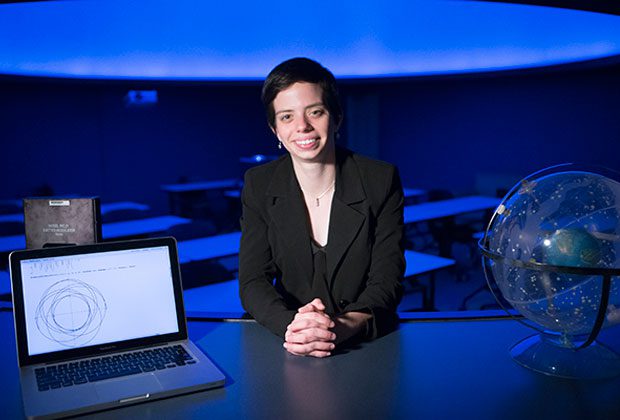An astronomical achievement

Furman mathematics professor Liz Bouzarth is aware of multiple people who have applied for a National Science Foundation’s Graduate Research Fellowship. She’s known exactly one to actually receive the prestigious award—Furman senior Kristina Pardo.
“Peers of mine who are now professors, when they were in graduate school they were unsuccessful,” Bouzarth said. “I have written recommendation letters for students when I was teaching at Duke, and they didn’t get it . . . She beat out some graduate students for this award. It’s very impressive.”
The Graduate Research Fellowship Program “recognizes and supports outstanding graduate students in NSF-supported science, technology, engineering, and mathematics disciplines who are pursuing research-based master’s and doctoral degrees.” More than 14,000 applied for the 2014 competition, but only 2,000 were offered awards that come with a $32,000 annual stipend for three years as well as a $12,000 cost-of-education allowance and XSEDE supercomputer access.
Pardo, a double math and physics major who has yet to even begin graduate school, got the news on April 1 and initially didn’t believe her good fortune. “No!” the Fort Lauderdale, Fla., native said when asked if she thought she had a chance to win. “I honestly applied thinking this is going to be good practice for me and I’ll try again next year because I think I’ll have a better chance. I wasn’t expecting anything . . . I really didn’t think it was real for a second. It was April Fool’s Day.”
Applicants’ hopes rest largely on their proposed research plan, which is something undergraduate students generally haven’t formulated all that clearly. Pardo, however, spent last summer in the Massachusetts Institute of Technology’s Summer Research Program studying black hole theory, and while the details are “a little bit hard to explain succinctly” the work she did and the direction she hopes to go with it when she begins pursuit of her Ph.D. in astrophysics at Princeton impressed the NSF.
“That was huge for me. That’s where I really found I love research,” Pardo said. “I’ve never worked so hard on something. I never thought I could work so hard. It showed me that grad school is the right option for me and I am in the right field.”
That kind of focus is rare, Bouzarth says. “If you’re an undergraduate sitting in college thinking about graduate school it’s hard enough to pick a graduate school and decide what field to start studying, let alone pick a research project. The task on the NSF side is they have to compare somebody who’s going into a math project with somebody who’s going into astrophysics or chemistry or biology. It’s great news for her, and for Furman.”
The Furman Scholars program coupled with a music scholarship lured her to South Carolina, but Pardo discovered she may not like music as much as she thought right around the time she found out math wasn’t so bad after all.
“I liked math a lot when I was little, and I stopped liking it kind of around middle school because of really bad teachers,” Pardo said. “I was in Dr. (John) Harris’ 160 class, which is a class you need for your physics major, and I realized that I actually did like math. He was just so good and he’s such a nice person and he was so happy to teach this stuff. He was just so excited about it, and I think that’s what got me excited too.”
“I’ve known her since she came as a freshman, and she was special from the beginning,” Harris says. “She has always been the kind of student that you really like to have in class because she’s engaged in the classroom and outside of the classroom, too. She’s bright and she’s motivated and she’s interested in lots of different things.”
Indeed, Pardo, a bassoon player, recently played her last concert as a Furman student and counts the East of the Rhine study abroad program led by professors Michael Bressler and Tim Fehler as perhaps her favorite Furman experience. But now it’s time to focus on one thing—albeit a pretty big thing.
“I’m interested in cosmology, the history of the universe, but I don’t know what I’m going to end up doing,” she said. “I definitely want to do theoretical work, work with math and computers basically. Not too much actual practical stuff. I tend to break things.”
For a complete list of winners, click here.